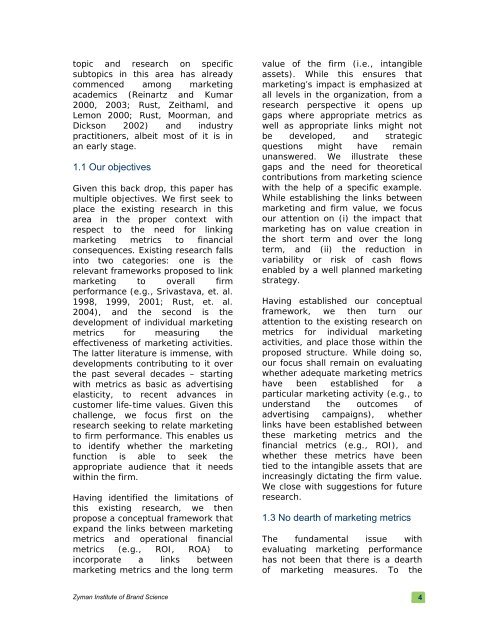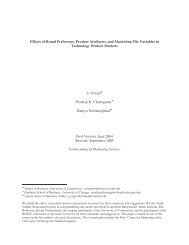<strong>to</strong>pic and research on specificsub<strong>to</strong>pics in this area has alreadycommenced among marketingacademics (Reinartz and Kumar2000, 2003; Rust, Zeithaml, andLemon 2000; Rust, Moorman, andDickson 2002) and industrypractitioners, albeit most of it is inan early stage.1.1 Our objectivesGiven this back drop, this paper hasmultiple objectives. We first seek <strong>to</strong>place the existing research in thisarea in the proper context withrespect <strong>to</strong> the need for linkingmarketing metrics <strong>to</strong> financialconsequences. Existing research fallsin<strong>to</strong> two categories: one is therelevant frameworks proposed <strong>to</strong> linkmarketing <strong>to</strong> overall firmperformance (e.g., Srivastava, et. al.1998, 1999, 2001; Rust, et. al.2004), and the second is thedevelopment of individual marketingmetrics for measuring theeffectiveness of marketing activities.The latter literature is immense, withdevelopments contributing <strong>to</strong> it overthe past several decades – startingwith metrics as basic as advertisingelasticity, <strong>to</strong> recent advances incus<strong>to</strong>mer life-time values. Given thischallenge, we focus first on theresearch seeking <strong>to</strong> relate marketing<strong>to</strong> firm performance. This enables us<strong>to</strong> identify whether the marketingfunction is able <strong>to</strong> seek theappropriate audience that it needswithin the firm.Having identified the limitations ofthis existing research, we thenpropose a conceptual framework thatexpand the links between marketingmetrics and operational financialmetrics (e.g., ROI, ROA) <strong>to</strong>incorporate a links betweenmarketing metrics and the long termvalue of the firm (i.e., intangibleassets). While this ensures thatmarketing’s impact is emphasized atall levels in the organization, from aresearch perspective it opens upgaps where appropriate metrics aswell as appropriate links might notbe developed, and strategicquestions might have remainunanswered. We illustrate thesegaps and the need for theoreticalcontributions from marketing sciencewith the help of a specific example.While establishing the links betweenmarketing and firm value, we focusour attention on (i) the impact thatmarketing has on value creation inthe short term and over the longterm, and (ii) the reduction invariability or risk of cash flowsenabled by a well planned marketingstrategy.Having established our conceptualframework, we then turn ourattention <strong>to</strong> the existing research onmetrics for individual marketingactivities, and place those within theproposed structure. While doing so,our focus shall remain on evaluatingwhether adequate marketing metricshave been established for aparticular marketing activity (e.g., <strong>to</strong>understand the outcomes ofadvertising campaigns), whetherlinks have been established betweenthese marketing metrics and thefinancial metrics (e.g., ROI), andwhether these metrics have beentied <strong>to</strong> the intangible assets that areincreasingly dictating the firm value.We close with suggestions for futureresearch.1.3 No dearth of marketing metricsThe fundamental issue withevaluating marketing performancehas not been that there is a dearthof marketing measures. To theZyman Institute of Brand Science 4
contrary, over the past few decades,marketers have developed a myriadmetrics for evaluating marketingperformance (a good review ispresented by Farris, et. al. 2006).Some of these include awareness,preference, purchase intent, share ofwallet, cus<strong>to</strong>mer satisfaction, loyalty,repeat purchase rate, just <strong>to</strong> name afew. Recent work by Ambler (2000)examines a number of commonlyused marketing measures. One ofthe fundamental issues is that themeasures used within the marketingfunction (e.g., loyalty) differ fromthose used within the financefunction (e.g., ROA), which in turnmay differ from those used by thecorporate board (e.g., shareholdervalue). A dominant reason why thisis the case is that marketingmeasures do not fit with the normallanguage of the firm – anaccounting-financial language, andthus marketing performancemeasures typically fall shy ofmanagement needs (Clark 1999;Ambler 2000; Brodie, Glynn andVanDurme 2002). This lack ofconformity with the corporatelanguage makes it difficult <strong>to</strong>compare marketing expenditureswith alternative expenditureselsewhere in the organization. Inorder <strong>to</strong> communicate well withother functional groups, marketersmust learn how <strong>to</strong> take the nextstep—converting measures such asprice/share premiums and brandloyalty in<strong>to</strong> cash flows and businessrisk. That poses the challenge ofproviding a translation of marketingoutcomes <strong>to</strong> financial measures. Theinterest in finding this link is nowgreater than ever.1.4 Changes in understanding firmvalue over the longer termThe last several decades has seen asteady shift from firm valuationbeing based primarily on physicalassets <strong>to</strong> being based on intangibleassets (Lusch and Harvey 1984).Where once the value of a firm waspredominantly (nearly 80%)determined by tangible assets,<strong>to</strong>day, nearly half of the value of thefirm is now based on intangibleassets (Ip 2004). Three of the mosthighly valued intangible assets areintellectual property, brand, and thefirm’s cus<strong>to</strong>mers. Two of the threeare clearly assets developed bymarketing, and the third, intellectualproperty (IP), may be potentiallyconnected depending on a firm’smarket context, and the extent of arole played by marketing role indeveloping new products andinfluencing the innovation process.For example, in a pharmaceuticalcompany, marketing might notcontribute much <strong>to</strong>wards thecreation of intellectual property, butfor a consumer products company itmight certainly directly influence thedirection IP would take.On limited occasions in the past,researchers have been able <strong>to</strong>establish a link between everydaymarketing metrics and its financialconsequence <strong>to</strong> the firm. Thedevelopment of marketing mixmodels has allowed marketers <strong>to</strong>connect spending <strong>to</strong> incrementalsales and market share (ref). With adirect connection <strong>to</strong> sales, it waspossible <strong>to</strong> show the financialimplications <strong>to</strong> the firm. Mostmarketing mix models focus on theimpact on sales over the baseline,but few show the impact on thebaseline as well, and few questionsabout the baseline are asked. Also,most of these studies have beencriticized because of their poordiagnostic capabilities and theirZyman Institute of Brand Science 5
- Page 1 and 2: Zyman Institute ofBrand ScienceZIBS
- Page 3: Linking Marketing Metrics to Financ
- Page 7 and 8: way in being accepted as a standard
- Page 9 and 10: cash flow from an opportunityadjust
- Page 11 and 12: value, the first step might be tobe
- Page 13 and 14: 3.1 Our conceptual frameworkTo outl
- Page 15 and 16: This next level of linkages isexplo
- Page 17 and 18: imagined, and moreover, notimperati
- Page 19 and 20: proposed above? We illustrate below
- Page 21 and 22: One interesting example in thiscont
- Page 23 and 24: satisfaction levels may go up, butc
- Page 25 and 26: assets. They represent investmentsw
- Page 27 and 28: discounted cash flow analyses. To b
- Page 29 and 30: REFERENCESAaker, David (1991), Mana
- Page 31 and 32: Farris, Paul, and David Reibstein (
- Page 33 and 34: Mizik, Natalie, and Robert Jacobson
- Page 35 and 36: Veliyath, Rajaram, and Stephen Ferr
- Page 37: Contacts:For further information, p





